 Petzlover
Petzlover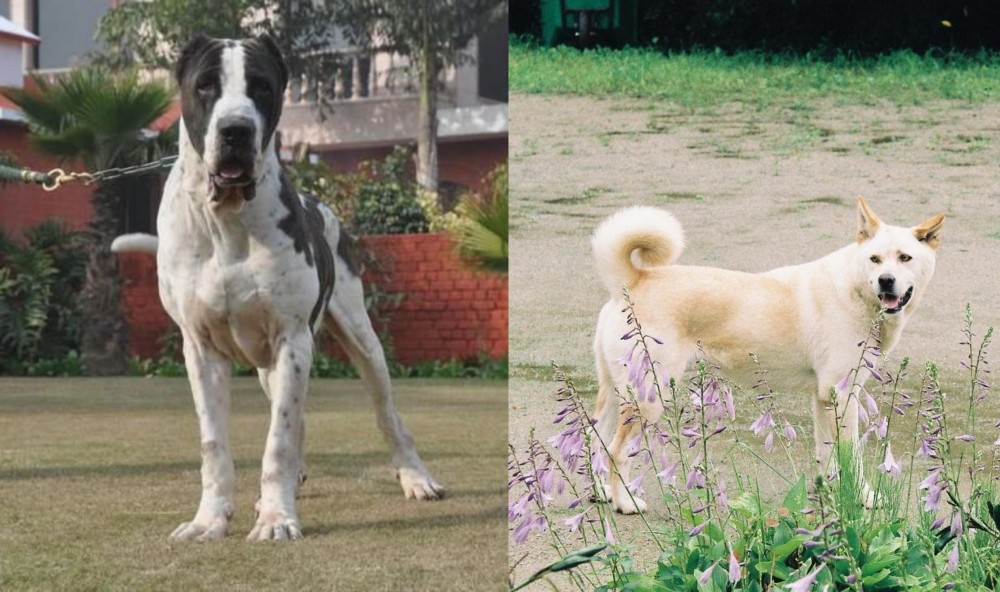 Alangu Mastiff is originated from Pakistan but Pungsan Dog is originated from North Korea. Alangu Mastiff may grow 26 cm / 11 inches higher than Pungsan Dog. Alangu Mastiff may weigh 66 kg / 146 pounds more than Pungsan Dog. Alangu Mastiff may live 5 years less than Pungsan Dog. Alangu Mastiff may have more litter size than Pungsan Dog. Alangu Mastiff requires Low Maintenance. But Pungsan Dog requires Moderate Maintenance
Alangu Mastiff is originated from Pakistan but Pungsan Dog is originated from North Korea. Alangu Mastiff may grow 26 cm / 11 inches higher than Pungsan Dog. Alangu Mastiff may weigh 66 kg / 146 pounds more than Pungsan Dog. Alangu Mastiff may live 5 years less than Pungsan Dog. Alangu Mastiff may have more litter size than Pungsan Dog. Alangu Mastiff requires Low Maintenance. But Pungsan Dog requires Moderate Maintenance
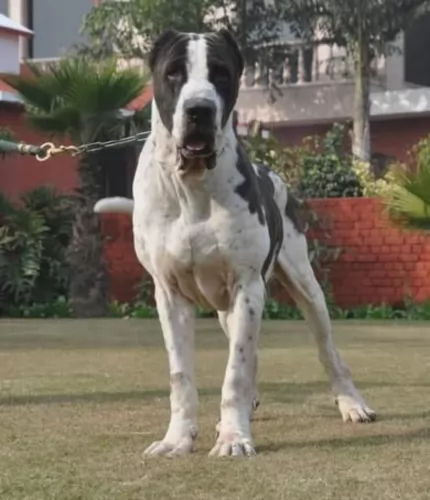 Alangu Mastiff is a breed that ,originates from southern India. Since the very beginning of this breed, it has been used as guard dogs and official dogs of Persian Army. They have been used mostly for wars and as a guard dogs for protection. Also, Alangu Mastiff was used as large gain hunters because of its size and power.
Alangu Mastiff is a breed that ,originates from southern India. Since the very beginning of this breed, it has been used as guard dogs and official dogs of Persian Army. They have been used mostly for wars and as a guard dogs for protection. Also, Alangu Mastiff was used as large gain hunters because of its size and power.
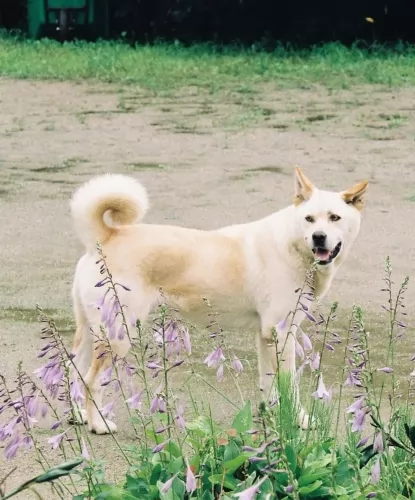 It is a hunting dog and considered to be a National Treasure of Korea. It was during the Japanese occupation of Korea that the dog’s thick coat was sought after for use in fur coats for the Japanese military.
It is a hunting dog and considered to be a National Treasure of Korea. It was during the Japanese occupation of Korea that the dog’s thick coat was sought after for use in fur coats for the Japanese military.
The population numbers plummeted dramatically, with the Korean War reducing the numbers even further. The North Korean government assisted with re-establishing them.
Today, the Pungsan isn’t recognized by the Federation Cynological International (FCI) and also remains unrecognized by any major kennel clubs.
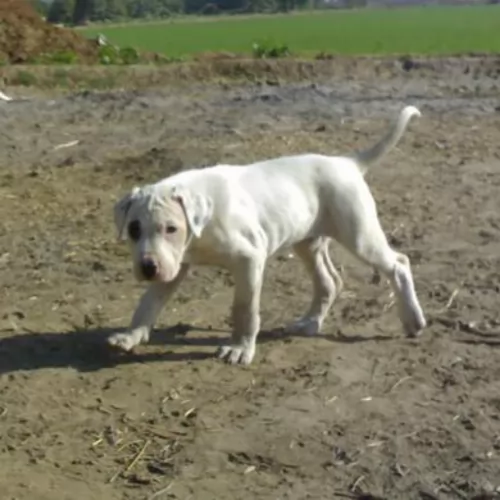 Weight of Alangu Mastiff depends but approximately, male weight is 70-90kg, while females are 60-70kg. While males height is 76-86cm. Females are slightly smaller with an average height of 75-80cm.
Weight of Alangu Mastiff depends but approximately, male weight is 70-90kg, while females are 60-70kg. While males height is 76-86cm. Females are slightly smaller with an average height of 75-80cm.
Lifespan depends drastically on every breed, but it is approximately 8-10 years.
The average litter size of Alangu Mastiff is 6-8 puppies.
Another Name for Alangu Mastiff is Sindh Mastiff.
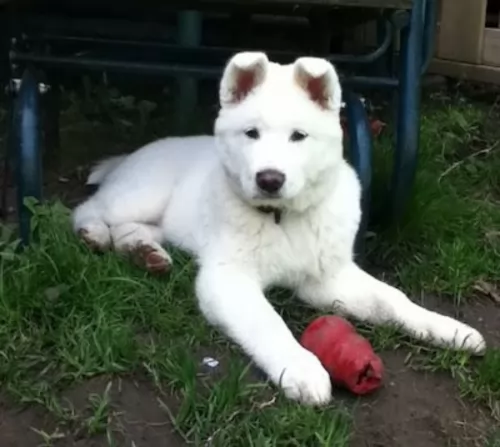 The Pungsan dog is a large dog – a kind of spitz-type dog which stands between 55 and 60cm in height and weighs between 18-24 kg.
The Pungsan dog is a large dog – a kind of spitz-type dog which stands between 55 and 60cm in height and weighs between 18-24 kg.
The dog has a thick whitish coat that even allows them to sleep in the snow. They have a muscular build with a deep chest. The legs are straight and strong, with the typical Spitz-type triangular head with the almond-shaped eyes and erect ears. The tail is high-set, curling over the back. After mating, within 60 – 70 days they can produce 2 to 4 puppies.
It it thought that the Pungsan’s intelligence is due to wolf DNA but there is a question mark over this. They are intelligent dogs though.
These dogs are always loyal and protective of their owners, forming strong bonds with them. They are strong-willed and independent and will require training and socialization if you want them to be obedient, well mannered dogs.
They’re intelligent so won’t have problems learning. When properly trained and socialized, they can be good playmates for children. He is also able to get along well with other animals in the house.
They’re aloof with strangers and have strong territorial instincts, but this just goes towards making them excellent watchdogs.
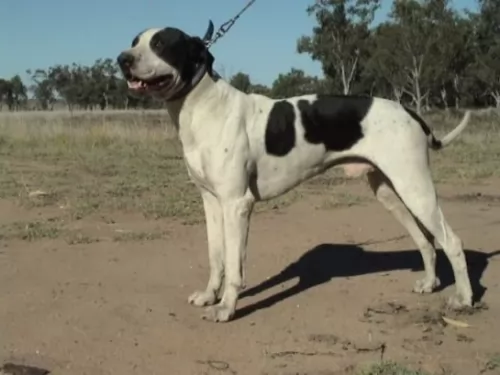 Alangu Mastiff is a very powerful breed. They are a giant breed that is very strong and protective. If you are first time owner, you definitely don’t want this breed as your first pet. They can be very aggressive, and if you are not a dominant owner who knows what he is doing all the time, you can have a lot of troubles with this breed. Alangu Mastiff is a guard dog, and they tend to protect the family no matter what is happening. Of course, with proper care and socialization, they can be wonderful pets that love family, and they can be gentle with children too. Basically, it is very important to socialize them from the earliest age. Alangu is also very hard to train, so you have to be patient and devote a lot of time to train your dog properly. Since they are large dogs, they require a lot of exercises. Walking with the leash is not enough for this breed. They need to run to be fully happy. They can be very aggressive towards other dogs, so it is not very recommendable to spend time with other pets, at least not if they are not socialized. If you train them from an early age, then you should still be careful how your dog behaves around other pets and animals. Don’t get this wrong, Alangu can be a wonderful pet for the whole family, but you have to be careful and well-trained for this breed. They require a lot of attention, patience and time, but overall they can be amazing pets.
Alangu Mastiff is a very powerful breed. They are a giant breed that is very strong and protective. If you are first time owner, you definitely don’t want this breed as your first pet. They can be very aggressive, and if you are not a dominant owner who knows what he is doing all the time, you can have a lot of troubles with this breed. Alangu Mastiff is a guard dog, and they tend to protect the family no matter what is happening. Of course, with proper care and socialization, they can be wonderful pets that love family, and they can be gentle with children too. Basically, it is very important to socialize them from the earliest age. Alangu is also very hard to train, so you have to be patient and devote a lot of time to train your dog properly. Since they are large dogs, they require a lot of exercises. Walking with the leash is not enough for this breed. They need to run to be fully happy. They can be very aggressive towards other dogs, so it is not very recommendable to spend time with other pets, at least not if they are not socialized. If you train them from an early age, then you should still be careful how your dog behaves around other pets and animals. Don’t get this wrong, Alangu can be a wonderful pet for the whole family, but you have to be careful and well-trained for this breed. They require a lot of attention, patience and time, but overall they can be amazing pets.
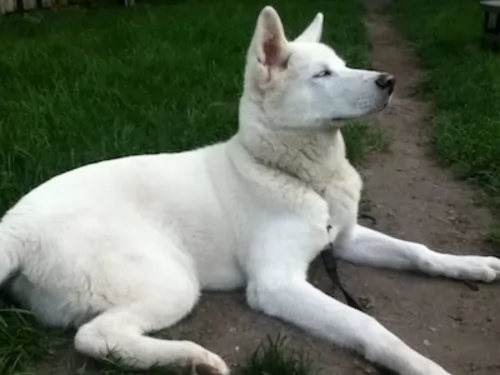 The Pungsan is a wonderful dog if you’re looking for an affectionate, loyal pet.
The Pungsan is a wonderful dog if you’re looking for an affectionate, loyal pet.
These dogs thrive on having an owner that is energetic and a strong leader. It likes to become involved in all the activities the family is involved in, loving to join them on hikes and camping trips. Its a dog that is also protective and territorial and makes a good watchdog too.
With proper training and socialization he gets on well with children and other pets in the home, making him a welcome canine family member for any busy household.
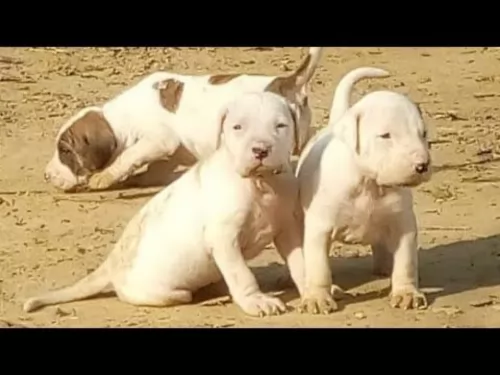 Basically most of the health problems depend on the dog to dog. If you choose puppy carefully, with an adequate examination of professional you will have a healthy dog. Alangu Mastiff is overall healthy breed, but as every other breed, they can develop some issues. Hip dysplasia is can be common for this breed, but again, only if you don’t select your puppy carefully.
Basically most of the health problems depend on the dog to dog. If you choose puppy carefully, with an adequate examination of professional you will have a healthy dog. Alangu Mastiff is overall healthy breed, but as every other breed, they can develop some issues. Hip dysplasia is can be common for this breed, but again, only if you don’t select your puppy carefully.
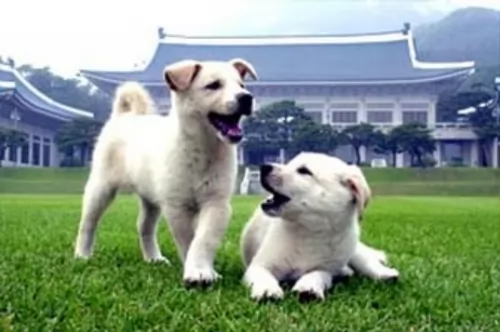 The Pungsan is a healthy breed prone to very few health issues, yet there will always be those common health issues that plague dogs like these. One of these is hip dysplasia, while others are obesity, bloat and cancer.
The Pungsan is a healthy breed prone to very few health issues, yet there will always be those common health issues that plague dogs like these. One of these is hip dysplasia, while others are obesity, bloat and cancer.
It can be very sad when your vet tells you that your dog has hip dysplasia. Fortunately with modern veterinary medicine, a dog can be kept happy with this ailment.
The hip joint doesn’t develop properly and painful wear and tear with arthritis makes it very difficult for the dog to be mobile. It’s a genetic condition but diet and environmental factors play a huge part too. Get your pet to the vet to ensure he is pain free.
Seizures in a dog can be caused usually because of trauma, tumor or infection. Seizures can start from as young as 6 months of age.Some seizures can last for a long time and are considered an emergency, requiring immediate veterinary help.Your veterinarian will want a complete history and perform a neurological exam.
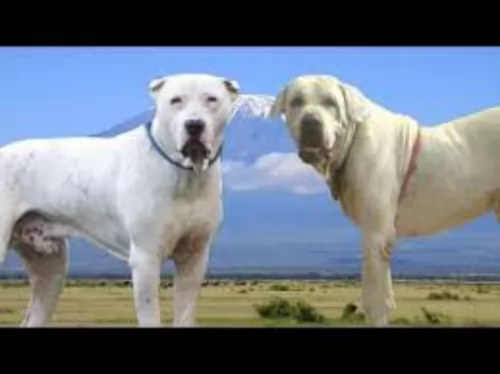 Feeding of your dog highly depends on activity, size, and food that you are feeding your dog. 5-10 cups of high-quality food divided into 2 meals would be enough for an average Alangu Mastiff, but again, you should feed your dog based on activity.
Feeding of your dog highly depends on activity, size, and food that you are feeding your dog. 5-10 cups of high-quality food divided into 2 meals would be enough for an average Alangu Mastiff, but again, you should feed your dog based on activity.
Puppies must eat 3-5 times per day, few cups of high-quality food. They need to eat quality food with a lot of vitamins and minerals to develop into a happy and healthy adult.
Groming is one of the easiest jobs that you should do around your Alangu Mastiff. They are very easy to take care off. Few brushes every now and then would be enough to have perfectly groomed pet. They do not have long coats with a lot of fur so there will be no hair around the house, and maintaining this majestic creature is very easy.
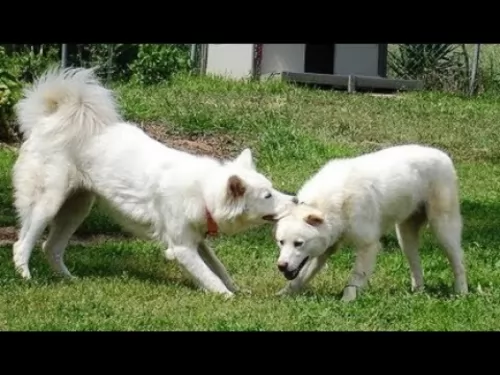 With his dense coat, this dog will require a brush twice a week to keep the fur free from matting and from loose hair. He is after all a fairly heavy shedder and will require this regular brushing to remove the dead hair and maintain the luster and sheen of the coat.
With his dense coat, this dog will require a brush twice a week to keep the fur free from matting and from loose hair. He is after all a fairly heavy shedder and will require this regular brushing to remove the dead hair and maintain the luster and sheen of the coat.
This is a strong, athletic dog and he is mentally sharp as well. He will require vigorous physical- and mental activity each day. He isn’t the kind of dog to lie around for long periods of time as this leads to frustration and destructive behavior and then the owner should be blamed.
Take him on walks or long hikes – he’ll love that – and play ball- and rope games with him. He will be quite game for swimming as well.
Your Pungsan dog can get to 14 years of age with good food. While you do get some excellent commercially manufactured dog foods, you want to be sure your pet gets some nutritious home-made food too.
Make sure that the kibble is the high quality ones with lots of vitamins and minerals. Add in some home-made food twice a week. Boiled chicken, brown rice or pasta and spinach, sweet potatoes and carrots are a healthy choice for your pet. Your dog will do well on plain, simple, nutritious, tasty food like this. Chop this food up and add it into the dry kibble a couple of times a week.
Some raw meat added in from time to time will help his skin and coat remain healthy. Never leave him without a constant source of fresh, cool water.